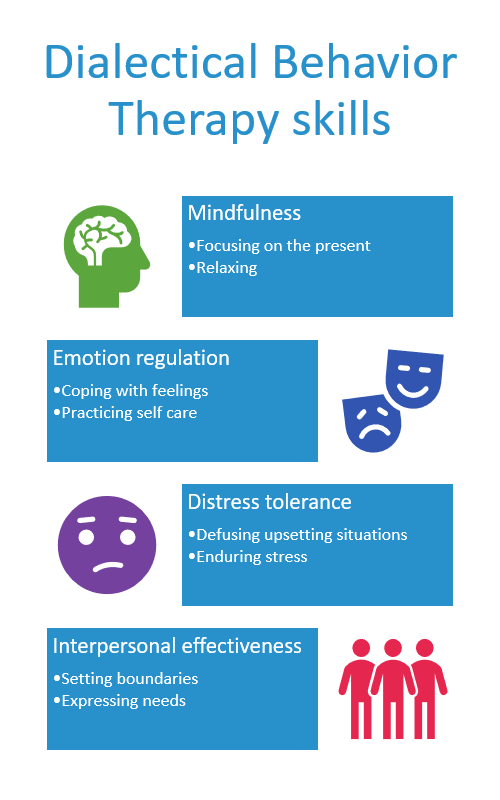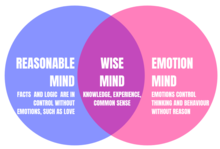Empowerment With DBT London: Structure Strength, Searching For Balance
Empowerment With DBT London: Structure Strength, Searching For Balance
Blog Article
Nurturing Emotional Strength and Self-Awareness With Dialectical Behaviour Treatment (Dbt) Providers: Your Trip to Inner Peace
In the pursuit of psychological resilience and self-awareness, the usage of Dialectical Practices Therapy (DBT) solutions uses an organized method that incorporates numerous essential principles to foster internal tranquility. Understanding the core tenets of DBT gives a strong structure for people seeking to navigate their emotional landscape with better quality and control.
Recognizing DBT Principles
An in-depth understanding of Dialectical Behavior modification (DBT) principles is essential for grasping its concepts and application in emotional resilience - DBT London. DBT is a therapeutic approach created by Marsha M. Linehan to aid individuals dealing with psychological dysregulation, usually connected with problems like borderline personality disorder. The core concepts of DBT focus on 4 main modules: mindfulness, distress resistance, emotion regulation, and social performance. Mindfulness is the foundation of DBT, highlighting present minute awareness without judgment. Distress resistance skills equip people to sustain and survive crises without making spontaneous decisions. Feeling law techniques help people identify and handle intense emotions effectively. Social efficiency abilities educate people just how to insist their demands while keeping relationships. By understanding these essential elements of DBT, people can grow emotional strength by learning to manage their emotions, navigate partnerships, and deal with upsetting scenarios extra efficiently. This foundational expertise establishes the phase for the effective application of DBT concepts in promoting psychological wellness and internal peace.

Developing Emotional Regulation Skills
Creating effectiveness in psychological law abilities is crucial for improving one's capacity to browse tough scenarios and manage extreme emotions successfully. Psychological regulation includes the capability to recognize, understand, and handle one's emotions in a healthy and balanced and positive way. By sharpening these skills, people can grow a higher feeling of self-discipline and resilience when faced with difficulty.
One secret aspect of creating psychological guideline skills is learning to acknowledge and label different feelings accurately. This self-awareness allows people to pinpoint the origin of their feelings and respond properly. In addition, exercising mindfulness techniques can help people remain present in the minute and prevent overwhelming emotions from hijacking their thoughts and activities.
Furthermore, executing healthy and balanced coping approaches, such as deep breathing workouts, progressive muscle mass leisure, or basing strategies, can offer people with reliable devices to control their feelings during times of distress. By constantly exercising these skills, people can develop a strong foundation for emotional durability and self-awareness, inevitably fostering internal tranquility and wellness.

Enhancing Interpersonal Effectiveness
With a strong structure in psychological guideline abilities, people can currently focus on developing their interpersonal performance to navigate social interactions with higher simplicity and success. Social performance, a crucial component of Dialectical Practices Therapy (DBT), outfits individuals with the essential tools to communicate assertively, established borders, and develop healthier connections. By learning to express needs and viewpoints clearly while valuing the perspectives of others, people can cultivate more meaningful connections and reduce problems in their link interactions.

Ultimately, enhancing social performance via DBT encourages people to browse numerous social contexts with durability, compassion, and authenticity, cultivating more fulfilling and harmonious partnerships in their lives.
Practicing Mindfulness Techniques
Mindfulness strategies play an essential duty in enhancing emotional law and promoting self-awareness in individuals undergoing Dialectical Practices Treatment (DBT) By promoting present-moment awareness without judgment, mindfulness empowers people to observe their thoughts and feelings with approval, leading to a much deeper understanding of their inner experiences. Through regular practice of mindfulness techniques such as mindful breathing, body scans, and conscious monitoring, individuals can develop an increased feeling of self-awareness and emotional strength.
One fundamental mindfulness strategy used in DBT is the "smart mind" principle, which encourages individuals to integrate their psychological and reasonable minds to make balanced choices - DBT London. This practice makes it possible for individuals to navigate psychological triggers with a calmer and extra sensible strategy, minimizing impulsive responses. Additionally, mindfulness strategies aid in grounding people in the present minute, steering them far from rumination on past occasions or stress and anxiety about the future
Building Distress Tolerance Approaches
To improve emotional strength in people undergoing Dialectical Behavior Therapy (DBT), it is vital to concentrate on building effective distress tolerance strategies. Developing these approaches is essential for people to browse through challenging circumstances without coming to be overwhelmed. Distress resistance skills aid individuals withstand and deal with extreme emotions, dilemmas, or scenarios where they might be lured to take part in unsafe habits.
One key distress resistance strategy usually educated in DBT is the ACCEPTS acronym, which means Activities, Contributing, Comparisons, Emotions, Pressing away, Ideas, and Feelings. These abilities supply individuals with a tool kit of techniques to distract themselves from upsetting feelings or circumstances in a healthy and balanced way.
In addition, finding out just how to self-soothe with activities like deep breathing workouts, taking a cozy bath, or participating in leisure activities can additionally aid develop distress resistance. By including these techniques into everyday technique, individuals can much better manage anxiety, control feelings, and inevitably cultivate a better sense of psychological resilience.
Conclusion
In final thought, the journey go to my site towards inner peace via Dialectical Practices Treatment (DBT) involves understanding its fundamentals, establishing psychological regulation skills, improving interpersonal efficiency, practicing mindfulness techniques, and building distress resistance techniques. By using these techniques, individuals can nurture emotional strength and self-awareness, bring about a better sense of internal tranquility and health. DBT London. Integrating DBT services right into one's life can provide valuable tools and resources for managing feelings and partnerships properly
Recognizing the core tenets of DBT supplies a strong foundation for individuals seeking to browse their psychological landscape with better clearness and control. By recognizing these fundamental facets of DBT, individuals can grow emotional resilience by discovering to handle their feelings, navigate partnerships, and cope with stressful circumstances extra properly.Mindfulness strategies play a crucial role in This Site enhancing emotional regulation and advertising self-awareness in individuals undergoing Dialectical Practices Therapy (DBT)One essential mindfulness strategy used in DBT is the "sensible mind" principle, which motivates individuals to integrate their emotional and logical minds to make balanced decisions.To boost psychological resilience in individuals undergoing Dialectical Practices Therapy (DBT), it is essential to concentrate on structure effective distress resistance approaches.
Report this page